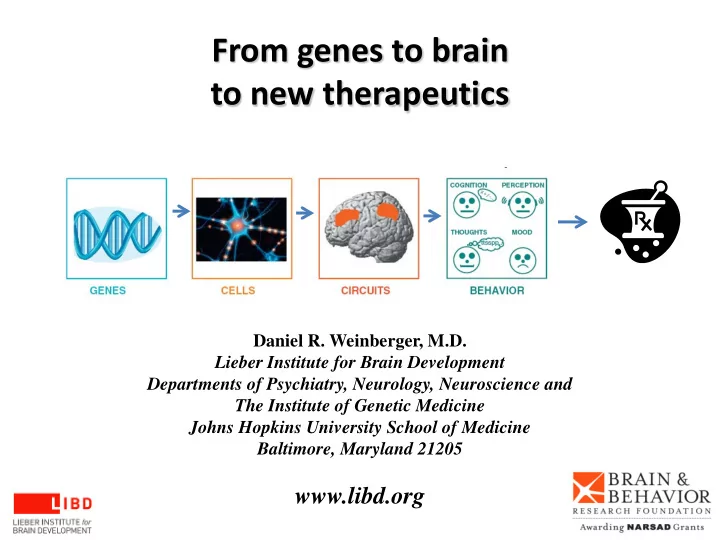

From genes to brain to new therapeutics Daniel R. Weinberger, M.D. Lieber Institute for Brain Development Departments of Psychiatry, Neurology, Neuroscience and The Institute of Genetic Medicine Johns Hopkins University School of Medicine Baltimore, Maryland 21205 www.libd.org
Schizophrenia: The essentials (ca . end of the 20 th century) • Diagnosis is based on subjective and nonspecific phenomena • Genes collectively account for most variance in risk • Environmental adversity in early development accounts for a small increase in risk • Subtle deviations in childhood development • Abnormal function of frontal and temporal cortical circuitry • Subtle nonspecific abnormalities in neuronal architecture • Antidopaminergic drugs are therapeutic
Developmental antecedents of schizophrenia are well established The later boys stand during the first year of life, the greater the risk of schizophrenia Age boys learned to stand Isohanni M, et al. Schiz Res . 2001;52:1-19.
Increased frequency of childhood enuresis in adult patients with schizophrenia 25 * P<.0001 20 Frequency of Enuresis 15 λ s = 2.6 Series1 10 5 0 1 2 3 Healthy Sibs Controls Patients N=234 N=335 N=211 Hyde et al Brain 2008
Low SES I mmigration Urbanicity Substance abuse Abnormal developmen Poor t cognitive Other performance psychiatric Schizophrenia disorder Social Older withdrawal father Perinatal Genetic complications predisposition
Psychiatric disorders are polygenic and genetically heterogeneous affected person unaffected “ nonpenetrant ” From: Goldman et al Nature Rev Genetics 2005
The genome wide association study (GWAS) of common sequence variants in the genome
PGC1 : can you believe 51,695 subjects? Ripke et al Nat Gen 2011
PGC 3 – let’s try 70,000 subjects! Now over 70 loci are GWAS “significant”
Four “loci” identified in 61,220 subjects Lancet 2013
N= 61,220 subjects (33,332 cases) Lancet 2013 Compare with: Sklar et al Nature Genetics 2011, N=11,974 cases
An Inconvenient Question: Why are the clinical associations so weak? Some answers: Heterogeneity Environmental modification rare variants epigenetics Epistasis GENES DO NOT ENCODE FOR PSYCHIATRIC SYNDROMES
A clinician’s perspective: Three key points in this talk 1. The genes for psychiatric disorders are not for psychiatric disorders. 2. Genetic risk is critically dependent on context (both genetic and environmental). 2. Genes impact on outcome and treatment response and will lead to new therapies.
Schizophrenia: genes and associated neurobiology cognition psychosis temperament Genes: Cells: Systems: Behavior: multiple subtle susceptibility abnormal molecular complex functional alleles each of information abnormalities interactions and small effect processing emergent phenomena
“ The path from changes in the score (DNA code) to changes in the music (behavior) ” ~ ~ ~ Cells: Genes: Distributed Perturbed Neural Systems: subtle synaptic multiple Cognition: molecular susceptibility abnormal as an emergent abnormalities alleles each of information phenomena processin g small effect
Schizophrenia: genes and associated neurobiology cognition psychosis temperament Genes: Cells: Systems: Behavior: multiple subtle susceptibility abnormal molecular complex functional alleles each of information abnormalities interactions and small effect processing emergent phenomena
Executive cognition in MZ twins discordant for schizophrenia 10 9 8 7 normal mean 6 Wisconsin Card Sort 5 Categories 4 3 2 1 0 Unaffected Affected Goldberg et al Arch Gen Psych 1990
Abnormal behavior reflects abnormal brain function cognition Psychiatric Disorder temperament Genes : Cells: Systems: Behavior: risk associated molecular abnormal complex functional genotypes biology information interactions and processing emergent phenomena
Abnormal prefrontal “efficiency“ : A schizophrenia intermediate phenotype The “N Back” working memory task fMRI Patients > Controls Healthy Siblings > Controls (N=13) (N=18) (N=48) (N=33) Callicott et al . Cereb Cortex 2000 Callicott et al. Am J Psychiatry 2003
Bipolar/schizophrenia risk associated gene CACNA1C modulates cortical efficiency during working memory in normal subjects N=316, p=.01 FDR corrected Extrapolated to N=10,000, p< 4.87e- 109 Bigos et al Arch Gen Psychiatry 2010
A clinician’s perspective: Three key points in this talk 1. The genes for psychiatric disorders are not for psychiatric disorders. 2. Genetic risk is critically dependent on context (both genetic and environmental). 2. Genes will impact on outcome and treatment response and lead to new therapies.
Genes also interact with the environment to modify the expression of their individual effects. This can lead to exaggerated, compensated, or novel effects.
Interaction of serious OC’s with SNPs in genes associated with anoxia-ischemia Nicodemus et al. Mol Psychiatry 2008.
Large structural variations in the DNA molecule (“CNVs”) occur during DNA replication Malhotra and Sebat Cell 2012
22q11 Hemideletion Syndrome: Velo-Cardio-Facial Syndrome (VCFS)
Specific recurrent CNVs are found in 2-5% of patients with the diagnosis of schizophrenia McCarthy et al Nat Genetics 2009 ISC Nat Genetics 2008
A clinician’s perspective: Three key points in this talk 1. The genes for psychiatric disorders are not for psychiatric disorders. 2. Genetic risk is critically dependent on context (both genetic and environmental). 2. Genes impact on outcome and treatment response and will lead to new therapies.
Genes are keys to the biology of cells * *
Na + -K + currents and the action potential
A Roadmap for Genes to Drugs CLINICAL STUDIES Gene(s) of interest RNA sequencing Transcript associated Transcript associated with illness state with genetic risk in brain Molecular mechanism of association Cell models based on Animal models based on molecular mechanisms molecular mechanisms
Genes, brain and drugs: Conclusions... • Most complex behaviors are the result of multiple factors that interact biologically. • Genes are the first objective clues to the causative mechanisms of psychiatric disorders. • There are many developmental pathways to what we call schizophrenia. • Genes for schizophrenia likely have their effects on risk by influencing brain development. • The genetics of psychiatric illness is the game changer both in understanding mechanisms and in finding therapeutic targets based on causation, not phenomenology. Check out our website: www.libd.org Learn more about the Brain & Behavior Research Foundation: bbrfoundation.org
Recommend
More recommend